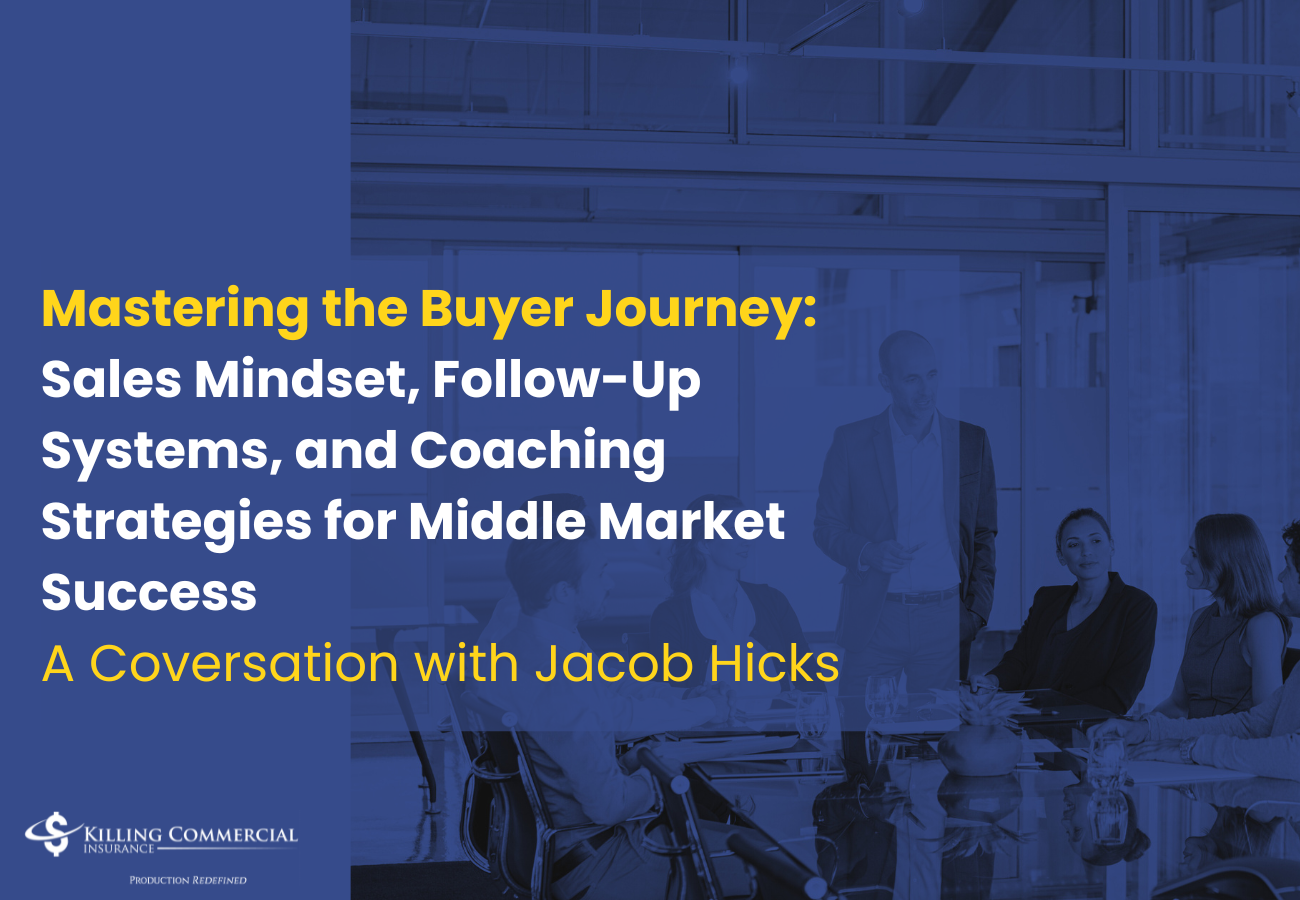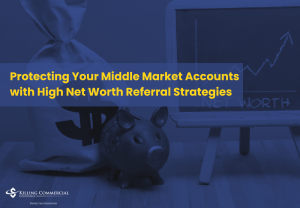
Killing Commercial Login

Producers face a sales environment that is fiercely competitive, time-consuming, and filled with complexity. The difference between average and exceptional isn’t always in knowledge or credentials—it’s in how producers think, how they follow up, and how committed they are to mastering the buyer journey.
Drawing on insights from a recent conversation with sales coach Jacob Hicks, this post explores the mindset, systems, and strategies that top producers use to stand out in a crowded marketplace. Whether you’re new to the game or looking to level up, this is your roadmap to becoming a sales leader in the middle market.
One of the most powerful takeaways from our discussion with Jacob was the importance of sales mindset. Too many producers set income goals based on what they think is possible, not on what they actually want. They get stuck aiming for $100,000 a year instead of thinking in terms of $100,000 a month.
As Henry Ford once said, “Whether you think you can, or you think you can’t—you’re right.” That simple truth governs the internal beliefs that drive external results. Jacob emphasized that salespeople who believe they’re capable of more—who stretch their goals, visualize success, and act accordingly—consistently outperform those who set conservative expectations.
In commercial insurance sales, your mindset directly influences your pipeline, your activity level, and ultimately your income. If you’re aiming for mediocrity, you’ll achieve it. But if you start thinking in bigger denominations, you’ll create a new standard for yourself—and that’s when the breakthroughs happen.
According to industry statistics, nearly 50% of salespeople fail to follow up more than once after an initial conversation. In middle market insurance, where deals can take months and involve multiple stakeholders, failing to follow up isn’t just sloppy—it’s business suicide.
Jacob put it bluntly: “Everyone has a follow-up system—even if it’s a bad one.” Whether your system is automated, manual, or nonexistent, it’s shaping your results every single day. The best producers treat their follow-up systems like a revenue engine, with pipelines built inside their CRMs, automated email sequences, task reminders, and personalized touchpoints.
What separates top-tier producers isn’t talent—it’s the discipline to show up again and again. Commercial insurance buyers are busy, distracted, and cautious. Following up with consistency builds trust, creates urgency, and keeps your name top of mind.

One of the most costly mistakes middle market producers make—especially early in their careers—is chasing every opportunity. When your back is against the wall or your pipeline is thin, it’s tempting to say yes to anyone who wants a quote. But that’s exactly how you burn time, energy, and goodwill.
Your ideal client profile (ICP) exists for a reason. It’s based on where you win, where you deliver value, and where your solutions fit best. Every minute spent working on unqualified leads is a minute stolen from your ideal buyers.
Jacob and I agreed: it’s more important for a new producer to learn how to say no than to chase every dollar. Sure, you might need to take a few lumps early on to figure it out, but once you’ve seen what a bad fit looks like, there’s no excuse for continuing down that path.
One of the more fascinating topics we tackled was the psychology of coaching and self-investment. As someone who coaches hundreds of producers through the Power Producers community, I’ve seen firsthand how the level of investment often determines the level of commitment.
Jacob shared that many people balk at his prices—yet they’ve done no research, haven’t looked at the market, and are unwilling to spend money to make money. Meanwhile, the producers in my community who invest the most are consistently the ones who perform at the highest levels. Why? Because they’ve got skin in the game. They show up, apply what they learn, and demand a return on investment.
The key point: Coaching isn’t an expense—it’s an accelerator. If you’re not actively investing in your own growth—whether through coaching, books, courses, or conferences—you’re being outpaced by someone who is.
Both Jacob and I started our sales careers in retail—him at Men’s Warehouse, me at Finish Line. And while we’ve both moved far beyond the mall, the sales training fundamentals we learned in those jobs still apply today.
At Men’s Warehouse, Jacob was taught to approach every customer with one simple question: “What event is bringing you in today?” Not “Can I help you?” or “What are you looking for?”—but something that opens up a story and gives context to the purchase. That mindset—lead with curiosity, not assumptions—is foundational.

At Finish Line, I learned a structured sales flow that focused on asking questions first, understanding the customer’s needs, and then educating them about the best solution. That same structure works whether you’re selling sneakers or six-figure commercial insurance programs.
Jacob’s transition from inside retail sales to outside sales in the optical industry mirrored the leap many producers make when shifting from personal lines to middle market. The difference? In outside sales, you control the narrative. You control who you call on, how you prepare, and whether you want to keep pursuing the opportunity.
That level of control is both empowering and dangerous. Without structure and intent, it’s easy to fall into the trap of chasing unqualified prospects or showing up unprepared. But when used wisely, it becomes your biggest asset.
The lesson: know your prospect. Research their business. Prepare your questions. Know your differentiators. And if they’re not a fit, walk away with confidence.
Today’s buyer is savvier than ever. They’ve done their research, they’re wary of being sold to, and they want a consultative experience—not a pitch. That’s why understanding the buyer journey is non-negotiable.
Whether you’re selling insurance, glasses, or suits, the buyer wants to feel understood, educated, and empowered. They want to feel like you “get” them—and that comes from asking the right questions, listening carefully, and tailoring the experience to their specific needs.
Great producers don’t sell products—they guide people through decisions. They remove friction, add clarity, and create confidence. That’s how you differentiate in a world full of sales noise.
Selling in the middle market isn’t for the faint of heart. It requires resilience, structure, strategy, and above all, belief in your ability to deliver value. But when you align your mindset, build solid follow-up systems, focus on your ideal client, and commit to growth, you create a powerful advantage.
As Jacob Hicks said best: “Just show up, shut up, and ask questions.” That might sound simple, but it’s one of the most overlooked strategies in the sales world. Consistency beats brilliance when brilliance isn’t consistent.
So, ask yourself:
The producers who answer “yes” to those questions don’t just survive in this market—they dominate it.

blog clinton houck

You could feel it—every producer, coach, and guest mentor knew this was the official start of something special. The conversation wasn’t just about competition. It was about purpose, legacy, and growth.
Hosted by David Carothers, creator of The Protege and founder of Killing Commercial, this kickoff call set the tone for what Season 3 will represent: a proving ground for producers who are ready to work harder, think deeper, and build something that lasts.

Influence is one of the most powerful tools we have in business, leadership, and personal life. Used well, it inspires people, builds trust, and creates ethical results. Used poorly, it can slide into manipulation and self-interest.

Reinvention is one of the most powerful themes in the insurance industry. Some of the best commercial producers in the country did not grow up wanting to sell insurance. They did not study risk management in college. They did not come from an agency family. They found this industry after they tried something else. They found it after life pushed them toward a career where performance, autonomy, and mindset determine the outcome.

The most successful producers in the middle market did not get there because they quoted faster, smiled bigger, or knew how to talk longer. They got there because they learned how to differentiate themselves so clearly that prospects had no choice but to see them as trusted advisors. They learned to operate like businesspeople first and insurance technicians second. They learned how to tie operational mechanics to insurance outcomes. They learned how to control their time, their pipeline, and their future.

In commercial insurance, the most dangerous threats to your book of business aren’t always visible on the loss runs. One of the most overlooked vulnerabilities for middle market producers is ignoring the personal lines needs of their business owner and executive clients.
There was a problem reporting this post.
Please confirm you want to block this member.
You will no longer be able to:
Please note: This action will also remove this member from your connections and send a report to the site admin. Please allow a few minutes for this process to complete.

Responses